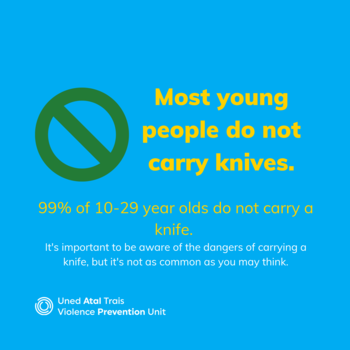Tackling Knife Crime Together
A national week of action
We at SchoolBeat are working with the Wales Violence Prevention Unit to support Wales’ four police forces to tackle knife crime as part of a national week of action, known as Operation Sceptre.
Jonathan Drake, Director, Wales Violence Prevention Unit, said:
“Knife crime is not inevitable – it can be predicted and prevented like any public health problem.
“To make knife crime a thing of the past, we must work together now to educate people on the dangers of carrying a knife, and get a true picture of the problem. We must also make sure there is the right support in place for both victims and perpetrators.”
One thing that is both clear and concerning to us, is that some young people feel carrying a knife will make them safer. This is absolutely not true. Carrying a knife is more likely to put you in danger as it may be used against you.
 SchoolBeat Officer Blog - Tackling Knife Crime (YouTube)
SchoolBeat Officer Blog - Tackling Knife Crime (YouTube)
SchoolBeat Officers will be talking to young people all over Wales to make sure they are aware of the devastating impact carrying a knife can have not only on their lives, but on the lives of friends and family and others in the community.
There is a tremendous amount of work taking place to make Wales safer, but to solve the problem, everyone must be a part of the solution.
If you are concerned about your own, a friend’s or loved one’s behaviour, there are people you can talk to 24/7, for free, confidential and non-judgemental advice and support.
For more information and details of support services, visit www.violencepreventionwales.co.uk/support
You can report a concern or crime anonymously at any time of day or night by visiting www.fearless.org
Did you know? Knife Crime – Key Facts
The law says:
- it is illegal to sell a knife to anyone under 18, unless it has a folding blade of 3 inches (7.6 cm) or less, for example a Swiss Army knife
- It is illegal to carry a knife in public without good reason (such as a fishing knife), unless it has a folding blade of 3 inches or less
- It is against the law to carry, buy or sell any type of banned knife or use any knife in a threatening way, this includes knives under 3 inches.
The good news is 99% of people aged 10–29 do not carry a knife. So, it's important to be aware of the dangers of carrying a knife. But, it's not as common as you may think.
Amongst the small percentage of young people who chose to carry a knife, most of them say they do so for personal protection.
However, 7/10 A&E admissions for knife injuries are a result of someone being stabbed with their own knife.
If you choose to carry a knife you are more likely to:
- be attacked or threatened by others, who also choose to carry a knife;
- be injured or worse by your own knife
- injure or even kill someone with your knife (this includes injuring people close-by who get in the way of a fight).

 SchoolBeat Officer Blog - Tackling Knife Crime
SchoolBeat Officer Blog - Tackling Knife Crime